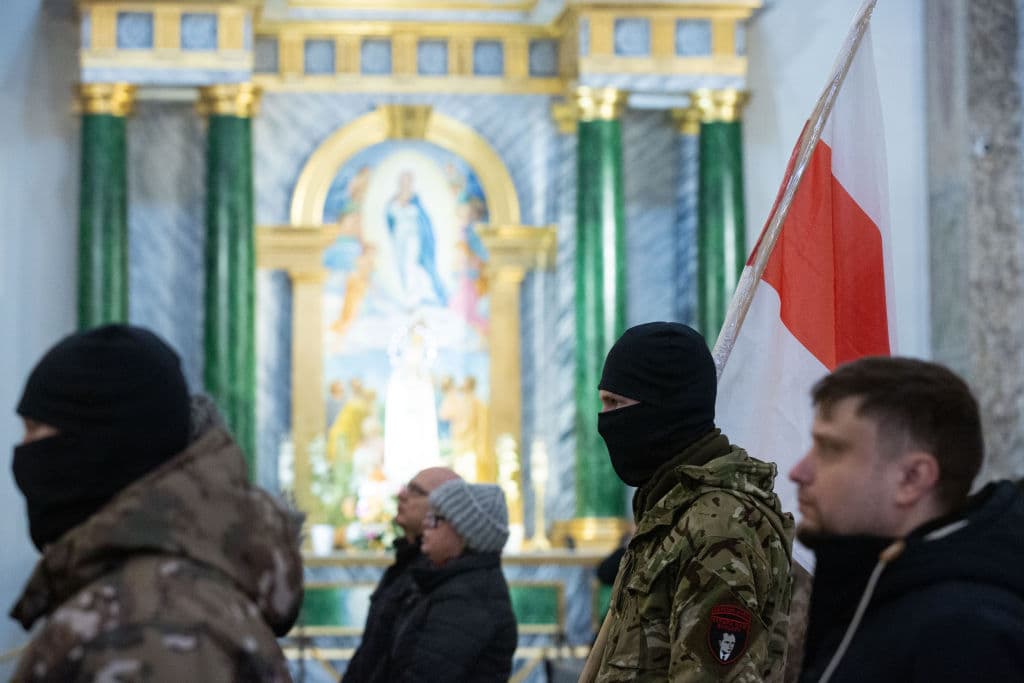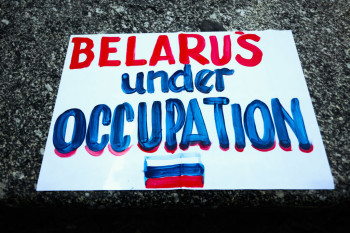Belarus Weekly: Minsk, Moscow plummet in latest Democracy Index

Belarus takes an unsurprising hit to its Democracy Index, published by The Economist Group, placing 153rd out of 167 countries.
Russian military aircraft remain in Belarus after finishing announced joint flight exercises in what is likely an effort by Moscow to bolster its forces in the country.
Belarus dictator Alexander Lukashenko signed a decree that allegedly allows Belarusians facing politically motivated charges to return to the country. Prior, activists who returned home were arrested upon arrival.
A new pro-regime political party enters the scene in what is considered an attempt by Minsk to fabricate the existence of a democratic system.
Belarusian athletes who oppose Lukashenko’s regime call on the IOC to allow them to participate in the upcoming Olympics.
Belarusian authorities sentence the attorney of the country’s only Nobel Peace Prize laureate to eight years in jail on politically motivated charges.
Democracy Index 2022: Belarus drops 7 places, reaches 153rd spot
Belarus fell seven places in the Democracy Index this year, leveling at 153rd.
The Economic Intelligence Unit, the research and analysis division of the Economist, publishes the annual report using the following criteria: electoral process and pluralism, functioning of government, political participation, political culture, and civil liberties.
The Democracy Index dubbed Belarus one of 2022’s “worst performers,” giving it an average score of 1.99 out of 10.00.
Belarus received a staggering 0.00 for “electoral processes and pluralism.” Since the fraudulent presidential election in 2020, Belarusian dictator Lukashenko has violently clung to power and stifled opposition.
The publication has labeled Belarus an authoritarian regime since its first report in 2006.
Russia also took a hit, falling 22 places in the Democracy Index to 146th – the steepest decline in 2022.
Russian aircraft remain in Belarus after completion of joint flight exercises
Russian aircraft remain in Belarus even after the end of the joint flight exercises conducted by Minsk and Moscow, monitoring group Belarusian Hajun reported.
Joint flight exercises with Russia took place across Belarusian military airfields from Jan. 16 to Feb. 1.
Belarusian Hajun suggested that the remaining aircraft will likely stay put to bolster Russia’s military presence in Belarus.
The Belarusian Defense Ministry said that the central aim of the exercises was to “increase operational compatibility in the joint performance of combat training tasks.”
The exercises were also aimed at improving air reconnaissance, airborne landings, border patrol, and the evacuation of wounded personnel.
The ministry claimed that the exercises were “not directed against third parties.”
“As of today, on the territory of Belarus, we do not see formed strike groups capable of launching an offensive on Kyiv,” Ukrainian Defense Minister Oleksii Reznikov said on Feb. 5.
He added that “no more than 12,000 Russian troops” are stationed at training grounds in Belarus.
Lukashenko signs decree to allow so-called ‘fugitives’ to return to Belarus
Lukashenko signed a decree on Feb. 6 to create an interdepartmental commission that will allegedly allow dissidents to return to Belarus without facing charges.
He said Belarusian nationals accused of a crime who wish to return to the country can submit an appeal before Dec. 31, 2023 – and make a public apology for any “wrongdoing” committed since Jan. 1, 2020.
The committee will consist of 29 individuals, including notorious Belarusian propagandists and pro-regime officials.
Among them are Foreign Affairs Minister Sergei Aleinik, state-owned Belteleradio Chairman Ivan Eismont, Deputy Head of Belarus’ KGB Ivan Tertel, propagandist Andrei Mukavozchyk, and – randomly – Belarusian Hockey Federation Head Alexander Bogdanovich.
Lukashenko also falsely stated that the number of Belarusians who have fled the country is at most 2,000 to 4,000 individuals.
However, the PACE Committee on Migration, Refugees, and Displaced Persons reported that somewhere between 200,000 to 500,000 Belarusians have fled the country since the fraudulent elections in 2020.
On Jan. 24, Lukashenko reiterated the need to get so-called “fugitives” – a term used by Belarusian authorities to refer to exiled opponents of the regime – to return to Belarus.
Exiled opposition leader Sviatlana Tsikhanouskaya has urged Belarusians not to trust the regime’s promise.
The Belarusian Border Committee reported that it detained 52 so-called “extremists” at the border upon returning to the country in 2022. Political prisoner Tatsiana Kurylina, who decided to trust the authorities’ promise, now awaits trial facing up to 15 years behind bars for running a Telegram chat that opposes Lukashenko’s regime.
New pro-Lukashenko party is launched amid suffocating political party restrictions
The creation of a pro-regime political party, “Belaya Rus,” was announced on Feb. 7.
“We need a force that will be a reliable support for the Belarusian state and its leader, the head of our state,” Belaya Rus’ Chairman Oleg Romanov said.
Romanov claimed the party has “no political ideology.”
On Jan. 25, the Belarusian parliament passed a bill on “political parties and other public associations,” imposing further restrictions on their creation and existence.
The bill raises the minimum number of political party members from 1,000 to 5,000 and requires that political party founders be born and reside in Belarus.
Political parties can be disbanded for the following: promoting so-called “war propaganda,” “terrorist” and “extremist” activities, actions that “harm the state (or) public interests,” and the “reception of funds and other property from foreign sources.”
Belarusian experts say new regulations leave zero room for opposition to Lukashenko’s regime. Instead, they attempt to fabricate the existence of a democratic political system.
Belarusian athletes that oppose Lukashenko ask to compete in 2024 Olympics
Belarusian athletes who oppose Lukashenko’s regime have called on the International Olympic Committee (IOC) to allow them to participate in the upcoming 2024 Summer Olympics.
They also asked the IOC to ban those who support Russia’s full-scale invasion of Ukraine or the Belarusian government.
The Belarusian Sports Solidarity Foundation published a declaration signed by over 50 people to “support the reinforcement of the sanctions already in place” against Russia and Belarus.
The IOC said on Jan. 25 that it plans to allow Russian and Belarusian athletes to participate in the Olympics under a neutral flag, despite international appeals to exclude them entirely.
The IOC said it will prolong its sanctions against the two countries, which include a ban on national symbols and the invitation of government officials, but will not prevent athletes from participating “just because of their passport.”
Ukrainian President Volodymyr Zelensky condemned the move. The Baltic states have also urged the IOC to reverse its decision, adding that a boycott is an option.
“Now is not the right time to consider their return; that is our position,” the Olympic Committees of Nordic countries said in a joint statement on Feb. 7.
Nobel Peace Prize laureate’s attorney sentenced to 8 years in jail
A Minsk court sentenced Vital Brahinets, the former lawyer of Belarusian Nobel Peace Prize laureate Ales Bialiatski, to eight years in prison on politically motivated charges.
On Feb. 2, Brahinets was convicted of creating a so-called “extremist group,” “grossly violating public order,” “inciting hostility,” and “calling for sanctions that harm national security.”
Bialiatski is the founder of human rights watchdog Viasna and a co-winner of the 2022 Nobel Peace Prize.
The trial against Bialiatski and his three colleagues began on Jan. 5. The four defendants face up to 12 years in prison for various politically motivated charges.
Brahinets was also Belarusian lawyer Andrey Machalau’s attorney. Machalau defended clients in politically motivated cases and had his license secretly revoked. He was then sentenced to two years of house arrest for using a “fake document” in a legal trial.
Many lawyers undertaking politically motivated cases have faced persecution in Belarus.
Viasna said at least 70 Belarusian attorneys have had their licenses revoked since 2020.












